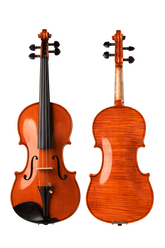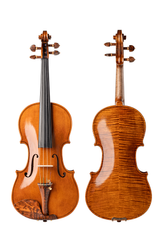A Must-Read for Violin Beginners: How to Improve Practice Efficiency
The violin, with a history of approximately 500 years, is renowned for its high technological content, profound cultural heritage, and significant artistic achievements. It is often referred to as the "Queen of Instruments" in the music world.
For beginners, learning to play the violin and mastering practice methods can be a challenging but rewarding journey. This article will provide key insights and techniques for effective violin practice.

Emphasize Open String Exercises
The Importance of Open String Exercises
Many violin beginners are eager to practice directly from sheet music, hoping to improve their playing skills through musical pieces while neglecting the importance of fundamental exercises. Basic exercises can be tedious and require repetitive actions for hours or even days. Beginners often lack patience for practicing already learned techniques and quickly want to move on to the next one, which leads to poor coordination between the left and right hands and frequent mistakes.
Open string exercises are a common fundamental practice in violin playing. They require the player to maintain high concentration and patience to complete each technique correctly. During these exercises, the left-hand remains still, focusing solely on the right hand's movements, such as holding the bow, bowing techniques, and bowing jumps. By identifying and correcting incorrect actions, and repeatedly practicing the correct movements, one can improve the right hand's proficiency. After mastering the right hand, one can then proceed to the left hand's movements to achieve high coordination and efficiency in practice.
Methods for Open String Exercises
- Practice in front of a mirror: This allows beginners to observe their actions, including bow hold, arm movements, the angle between the bow and strings, and arm angles. Recording practice sessions and reviewing them can reinforce learning and highlight areas needing improvement.
- Pay attention to body sensations: Beginners should be aware of how their fingers feel during bowing, the sensation in the palm when changing the bowing direction, and the overall feel of the right hand while holding the bow. Developing a tactile connection with the violin is crucial.
- Train different bow segments separately: Focus on one bow segment at a time, maintaining correct finger movements. Start with slow-motion practice, gradually increasing speed as proficiency improves. Only after mastering one segment should one move on to the next.
- High-difficulty pieces: When encountering challenging pieces, ensure the right hand is familiar with the required techniques. Repeatedly practice these advanced techniques and integrate them to achieve full mastery of bowing methods.
- Understand sound production: Learn how to produce the desired tones by adjusting string positions and bowing angles. Practice producing double stops and chords to improve sound production skills.
- Comprehensive training: After targeted right-hand exercises, engage in combined practice, integrating various actions to improve skill transitions and overall playing level.
Left-Hand Fingering Exercises
After addressing right-hand issues, beginners should focus on left-hand fingering. Place the entire left hand on the fingerboard, keeping fingers relaxed, with the thumb not applying pressure, using the pads of the remaining four fingers to press the strings. The thumb and index finger should be parallel on either side of the neck, with space between them for flexible position shifts. Label the four fingers (excluding the thumb) for simple fingering exercises to enhance finger flexibility. After some time, incorporate right-hand coordination, paying attention to the violin's sound under different fingerings, and practice to improve pitch accuracy and tonal control.
Violin Holding Practice
Long practice sessions can cause physical fatigue for beginners, hindering concentration and progress. Therefore, mastering proper violin holding techniques is essential to reduce fatigue and maintain focus during practice.
Rotate the support points:
Use the chin, collarbone, shoulder, and left hand to support the violin, allowing each part to rest in turn. For low positions, let the thumb and index finger take most of the weight, relaxing neck muscles. For high positions, use the chin and collarbone, and in very high positions, involve the shoulder.
Shoulder involvement:
Generally, the shoulder should not support the violin to avoid fatigue. However, it should engage when needed to relieve pressure on other areas.
Body support:
The violin's scroll should be lower than its body, allowing the shoulder to support it effectively without constant elevation. This distributes weight more evenly, reducing shoulder strain and increasing left-hand participation. Rest the left elbow against the ribs to share some of the weight, providing the left hand with needed breaks.
Conclusion
When practicing the violin, focus on understanding the music's expressive content and the unique characteristics of different cultures and periods. Developing your playing style, rather than mechanically imitating others, is crucial.
By combining personal traits with technical proficiency, you can produce music with pure tone quality, good rhythm, precise pitch, and beautiful sound. Practicing the violin is an expression of my love for music.
Whether you start willingly or reluctantly, immersing yourself in practice can make it an enjoyable and fulfilling experience.





